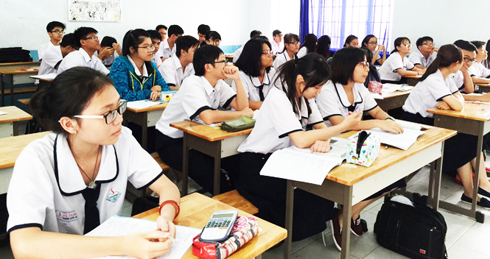National Defense and Security (ND-S) is an extremely important and necessary field in the current political security situation. The Communist Party and our State always advocate for strengthening the educational work of ND-S across the entire Communist Party and the entire population; this includes education on ND-S for students—the younger generation who undertake the great mission of defending the Homeland and protecting society.
Aside from the regulations of the National Defense and Security Law passed by the National Assembly of the Socialist Republic of Vietnam, XIII Legislature, 5th Session on June 19, 2013, the Ministry of Education and Training recently promulgated three Circulars (effective from March 1, 2017) related to the work of QPAN education in schools for students at different educational levels: primary, secondary, high school, and higher education, including colleges and intermediate levels.
1. Integrating QPAN into the content of subjects for primary and lower secondary school students
According to the guidance in Circular 01/2017/TT-BGDDT, integrating QPAN education through the content of subjects in the primary and lower secondary education program aims to build and develop thinking, nurture life skills, and shape the character of Vietnamese people, highlighting pride and self-respect for the national tradition of fighting against foreign invaders, a sense of discipline, solidarity, patriotism, and love for compatriots.
- QPAN education in primary schools is integrated through the content of subjects such as Vietnamese Language, Natural and Social Sciences, Ethics, History, and Geography, focusing on key themes such as patriotism, the historical tradition of nation-building and defense; the history of the military and police; life skills suitable for societal development; and fostering love for hometown, peace, and the country.

- QPAN education in lower secondary schools is incorporated through subjects like Literature, Geography, Civic Education, Music, and Fine Arts; focusing on the spirit of solidarity and patriotism of Vietnamese generations throughout revolutionary periods; initial knowledge of firefighting and personal safety; the laws of the Socialist Republic of Vietnam; citizens' rights and responsibilities towards national construction and defense.

2. Making QPAN education a main subject in high schools
Circular 02/2017/TT-BGDDT issued by the Ministry of Education has set the objective of making QPAN education a core subject in high schools. Through this subject, students will learn and understand:
- Key contents about the history and traditions of the People's Armed Forces, QPAN education, main points from several legal documents regarding QPAN; territorial sovereignty, national borders;- Fundamental issues in maintaining political security, ensuring social order and safety, plots and methods of "peaceful evolution," subversion by hostile forces against Vietnam's revolution, thus fostering crime prevention and social evils awareness in schools;- Basic skills in team regulations; infantry techniques and tactics; knowing how to use AK submachine guns; applying individual tactical movements in military, security skills practice content.
Attached to Circular 02 is the QPAN education program for three grades, totaling 105 periods, each 45 minutes long.
- Grade 10: 35 periods, consisting of 10 topics divided into 17 theory periods and 18 practice periods.- Grade 11: 35 periods, consisting of 8 topics divided into 16 theory periods and 19 practice periods.- Grade 12: 35 periods, consisting of 8 topics divided into 10 theory periods and 25 practice periods.
3. Allocating QPAN education into course modules at universities
The national defense and security education program in intermediate pedagogy schools, colleges, and higher education institutions is included in Circular 03/2017/TT-BGDDT. It details the following modules:
- For intermediate pedagogy schools: Based on training objectives and the particular nature of the course, the national defense and security education program in intermediate pedagogy schools includes 4 modules with a total duration of 120 periods.- Module I: Supplementary knowledge of higher secondary QPAN education (applicable to students entering with lower secondary school graduation)- Module II: National defense and security knowledge- Module III: Military skills- Module IV: Humanities and social sciences
Intermediate pedagogy students entering with lower secondary school graduation will study 4 modules: I, II, III, IV; those entering with higher secondary school graduation will study 3 modules: II, III, and IV.

- For pedagogy colleges and higher education institutions: Based on training objectives and the particular nature of the course, the national defense and security education program in pedagogy colleges and higher education institutions includes 4 modules with a total duration of 165 periods, which include:- Module I: The defense and security policies of the Communist Party of Vietnam- Module II: Defense and security work- Module III: General military, tactics, short-range shooting techniques and grenade usage;- Module IV: General knowledge about military branches and units
The national defense and security education program in pedagogy colleges and higher education institutions is designated for students not majoring in national defense and security education at full-time and part-time higher education institutions; and higher education institutions cooperating with foreign training systems.
 Article table of contents
Article table of contents





.Medium.png)
.Medium.png)
.Medium.png)
.Medium.png)
